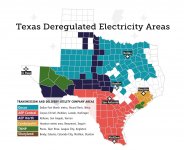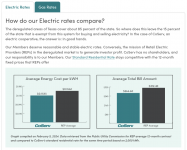I guess I misunderstood the phrasing. It seemed like maybe you had a property at or near the interface of 2 different utility companies’ service areas (based on “100 yards apart”), and wanted to know why you couldn’t choose either service? I was particularly curious if you had a compelling reason to choose one or the other.There isn’t an option so you pay the price they set.
There are lots of places currently with infrastructure and ability where you could easily buy from 1 or the other but you can’t bc of government.
If you could, price per kWh would go down.
To play devil’s advocate, let’s set aside the fact that there are defined usage areas, with Public Service Commissions, etc. - and you’re either in one or the other. Let’s pretend that its open kimono, but you still have to account for added infrastructure for T-ing into an existing service area that’s not your “base” service.
Say you live on the south side of a street. Your utility provider is Company A. The houses on the north side of the street are Company B. You decide that you like Company B better for whatever reason. Let’s say you have underground utilities, which for this particular example is probably the most simple and straightforward case study.
So, you decide you’re switching to Company B. You call Company B to tell them you want to start using them. Company B says, “OK great, but its going to take a minute. First I need you to fill out this paperwork, then you also have to pay this New Service one-time fee of $X to start the process”. Then they are going to have to get permits / approvals to do excavation, additional line hook up, concrete cutting and patching to run under the road and sidewalk, etc. Then they are going to have to reach out to your current utility company to get a map of the lot showing their line locations and hazard areas. Then they’re going to have to dig up your yard, hook up a new meter, and then have an electrician switch over the service point at the property.
That’s all going to cost Company B a hell of a lot of money, which really means its going to cost YOU a lot of money. And that is the most simple, straightforward, and hassle free way of theoretically going outside your normal service area. I really don’t believe there are any 2 utility companies in the south that are so wildly different in price structure and/or reliability to justify such an expenditure.
So yes, while there are politics and horse trading and bureaucracy of both the companies and the city / state governments involved, I think it does cut pretty evenly, and it streamlines the process of getting the product to the end users. Imagine the taxpayer expenditures of running 2x or 3x as many lines, transformers, substations, and the admin costs associated with managing that much messier grid for a given municipality. That’s what it would take to allow people to switch their utility companies as easily as jumping from Netflix to Hulu, or AT&T to Verizon. And it would all be done for a freedom that probably 99.9% of people don’t really give a crap about. That high cost / low benefit ratio is the actual answer to your question. Juice ain’t worth the squeeze.





